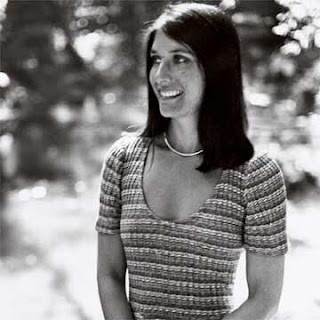Mimi Farina (April 30, 1945 – July 18, 2001) was an American singer-songwriter and activist, the youngest of three daughters to a white mother and Mexican-American physicist Albert Baez. She was the younger sister of the singer and activist Joan Baez.
Born Margarita Mimi Baez, in Palo Alto, California, to a British mother and Mexican physicist father, she was the third of three daughters. Being raised as a Quaker, she later claimed, encouraged her social conscience and a steadfast belief in non-violence. Her striking dark looks and feisty personality made her a natural performer, and, as a child, she showed rare talents as a dancer. But she also became an accomplished violinist and guitar player, and was a familiar figure at the burgeoning late-1950s and early-1960s folk movement in Cambridge, Massachusetts.
By the time she was 16, she had embarked on a solo singing career, writing her own songs and travelling across Europe playing her music. In Paris, she met - and fell in love with - the man whose tragic fate left an indelible mark on her life, novelist, musician, and composer Richard Fariña (1937–1966). She married him at age 18 in Paris. The two collaborated on a number of influential folk albums, most notably, Celebrations for a Grey Day (1965) and Reflections in a Crystal Wind (1966), both on Vanguard Records. After Richard Fariña's death in a motorcycle accident on April 30, 1966 (on Mimi's twenty-first birthday), she moved to San Francisco, where she flourished as a singer, songwriter, model, actress, and activist. She performed at various festivals and clubs throughout the Bay Area, including the Big Sur Folk Festivals, the Matrix, and the hungry i.
 |
| Bob Dylan, Joan Baez, Mimi Farina, Joan Bridge |
Fariña briefly sang for the rock group the Only Alternative and His Other Possibilities. In 1967, she joined a satiric comedy troupe called The Committee. That same year, she and her sister Joan Baez were arrested at a peaceful demonstration and were housed temporarily in Santa Rita Jail, personalizing the experience of captivity for her. In 1968, Fariña married Milan Melvin and continued to perform, sometimes recording and touring with either her sister Joan or the folksinger Tom Jans, with whom she recorded an album in 1971, entitled Take Heart. Fariña and Milan divorced in 1971.
Here’s “Mary Call” from above LP
Among the songs she wrote is "In the Quiet Morning (for Janis Joplin)", which her sister recorded and released in 1972 on the album Come from the Shadows. The song is also included on a number of compilations, including Joan Baez's Greatest Hits. By 1973, Fariña was asked to accompany her sister Joan and B.B. King when they performed for the prisoners in Sing Sing Prison. This experience, along with her arrest in 1967, led her to a desire to do more for those who are held in institutions.
In 1974, Fariña founded Bread and Roses, a non-profit organization that brings free live music and entertainment to children, adults, and seniors who are isolated in institutional settings: children's day care and special needs schools, hospitals, adult and juvenile detention facilities, homeless shelters, adult recovery centers, senior day and convalescent homes. Bread and Roses serves isolated audiences in eight counties in the San Francisco Bay Area, and consults with other like-minded programs nationally. In 2019, Bread and Roses brought performers to play more than 600 concerts in over 120 institutions.
Though she continued to sing in her later years, releasing an album in 1985 and performing sporadically, Fariña devoted most of her time to running Bread and Roses. In the late 1980s, she teamed with Pete Sears to play a variety of benefit and protest concerts. Many concerts were concerned with human rights issues in Central America, especially the U.S.-backed civil wars in Guatemala and El Salvador. They once set up to play on the abandoned railroad tracks outside the Concord Naval Weapons Center in California. Surrounded by military police, Fariña and Sears played a show for people protesting U.S. weapons being shipped to government troops in El Salvador.
In 1985, she recorded her own album Mimi Fariña Solo. Bread and Roses also has a CD—produced by Banana, aka Lowell Levinger, with Michael Kleff—of a series of concerts that she gave with Banana in Germany in the 1980s. Fariña used her connections with the folk-singing community to elicit help in supporting Bread and Roses, including Pete Seeger, Paul Winter, Odetta, Hoyt Axton, Judy Collins, Taj Mahal, Lily Tomlin, Carlos Santana, Bonnie Raitt, and others. There are now more than 15 other community organizations modeled after Bread & Roses across the country.
Fariña died after a two year battle with neuroendocrine cancer at her home in Mill Valley, California on July 18, 2001, at age 56. A memorial service was held on August 7 at Grace Cathedral in San Francisco. 1,200 people attended.
(Edited from Wikipeda & The Guardian)







